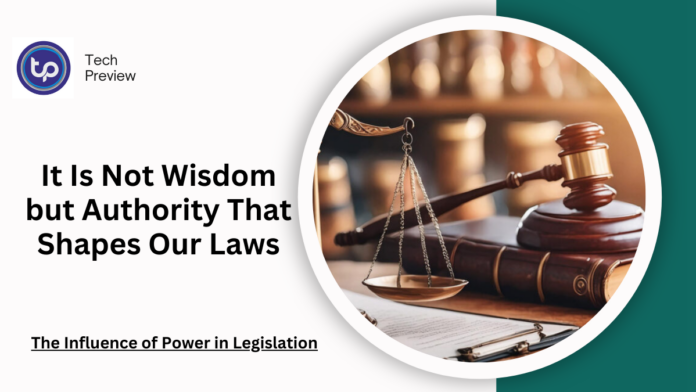The phrase “It is not wisdom but authority that shapes our laws,” attributed to Tymoff, reveals a fundamental truth about the origins of legal systems.
This idea emphasizes that laws often arise from the decisions of those in power rather than from the thoughtful contributions of the community.
Recognizing this distinction can significantly shift our understanding of how legal frameworks function and how they impact our lives, highlighting the pervasive influence of authority in shaping legislation.
Authority in Action
Throughout history, laws have typically been established by individuals or groups wielding authority—think kings, dictators, or elected officials.
In ancient civilizations, such as those in Egypt and Mesopotamia, monarchs issued decrees that became the law of the land.
The famous Code of Hammurabi is a prime example, showcasing how authority dictated societal rules without considering the perspectives of the common people.
These ancient laws often prioritized the ruler’s will over the welfare of the citizens.
ALSO READ: When Doubled a Mild Reprimand: A Guide to Idioms and Their Significance
What Is Authority?
To fully grasp the implications of authority in law-making, it’s essential to understand its various forms:
- Traditional Authority: This type is rooted in customs and long-standing practices, where laws are based on historical norms.
- Charismatic Authority arises from an individual’s exceptional personal qualities, allowing them to inspire loyalty and adherence to their directives.
- Legal-Rational Authority: Grounded in established laws and procedures, this authority operates within a framework of rules designed to govern fairly.
Each of these types of authority plays a crucial role in shaping laws, often favouring the interests of those in power rather than the community’s collective wisdom.
The Role of Wisdom
In an ideal society, laws would be shaped by collective wisdom—thoughtful and informed decisions made for the public good.
However, the reality is that “It is not wisdom but authority that shapes our laws.” Wisdom involves using knowledge, experience, and understanding to craft just and beneficial laws.
When wisdom guides law-making, societies often witness positive outcomes, such as progressive social policies that prioritize the welfare of all citizens.
Countries that have embraced wisdom-driven legislation, like those in the Nordic region, serve as excellent examples of how thoughtful governance can lead to thriving communities, contrasting with the influence of authority that can sometimes overshadow these ideals.
The Challenge of Authority-Driven Laws
When authority eclipses wisdom, significant challenges arise. Laws enacted under authoritarian regimes can lead to widespread injustice and oppression.
Historical examples, such as apartheid laws in South Africa or the era of Prohibition in the United States, illustrate how power can be misused to create laws that do not reflect societal needs or values.
These laws often prioritize control and compliance over fairness and justice, resulting in societal harm.
Moreover, authority-driven laws can create a culture of fear and mistrust.
When people feel that laws are imposed upon them rather than developed with their input, they are less likely to respect or follow those laws.
This lack of legitimacy can lead to civil unrest and a breakdown of social cohesion, highlighting the crucial need for wisdom in the law-making process.
Finding Balance
For a legal system to function effectively, it is essential to strike a balance between authority and wisdom. This balance ensures that laws are not only enforceable but also just and equitable.
As the phrase “It is not wisdom but authority that shapes our laws” suggests, authority plays a significant role.
Still, democratic systems often strive for this equilibrium by incorporating checks and balances that allow for input from various stakeholders, including the public.
Engaging citizens in the law-making process fosters a sense of ownership and responsibility, which can enhance the legitimacy of the laws enacted.
By prioritizing both authority and wisdom, we can create a legal framework that truly serves the needs of society.
The Role of the Judiciary
Judges play a critical role in maintaining this balance. Their responsibility to interpret laws and apply them fairly adds an important layer of wisdom to the legal process.
When judges prioritize justice over mere adherence to authority, they help foster public trust in the legal system.
This trust is essential for the smooth functioning of society, as people are more likely to comply with laws they perceive as just.
Furthermore, the judiciary acts as a check on the power of the legislative and executive branches, ensuring that laws align with fundamental principles of justice and human rights.
In this way, the judiciary serves as a guardian of wisdom in the law-making process.
Public Perception Matters
Public opinion plays a significant role in the acceptance and effectiveness of laws. Laws that are viewed as wise and just tend to garner broader support from the community, while those perceived as purely authoritative often encounter resistance.
When people believe in the fairness and rationale behind a law, they are more likely to comply, leading to a more harmonious society.
Conversely, laws that lack public support can result in civil disobedience and challenges to authority.
For instance, the repeal of Prohibition in the United States was largely driven by public sentiment against the law, highlighting how crucial it is for laws to reflect the collective wisdom of the populace.
Conclusion
The relationship between authority and wisdom in law-making is vital for creating just and effective legal systems.
While authority is necessary for establishing laws, “It is not wisdom but authority that shapes our laws,” highlighting that the decisions of those in power often dominate the legislative process. Infusing wisdom into this process can help ensure that those laws benefit society as a whole.
By striving for a balance between the two, we can work toward a future where laws are not only enforceable but also fair and equitable for everyone, ultimately fostering a legal landscape that reflects both authority and the collective wisdom of the community.
People May Ask
Tymoff’s statement emphasizes that laws are often created by those in power rather than through the thoughtful input of the community.
Historically, rulers or monarchs have dictated laws without public input, demonstrating how authority can dominate the law-making process.
Why is wisdom important in creating laws?
Wisdom ensures that laws are not only enforceable but also just and beneficial for society, promoting fairness and equity.
By implementing systems that allow for public input and judicial oversight, we can create laws that are both authoritative and wise.
Click here to learn more.









